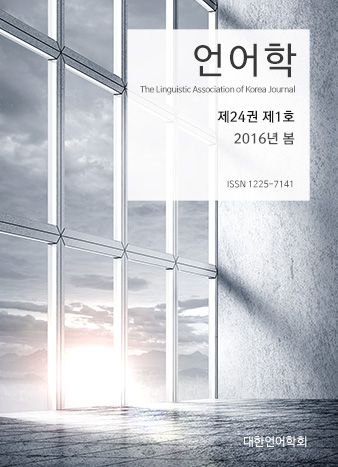대한언어학회 전자저널

Abstract
Kim, Hye Jeong. (2016). A study of an explicit learning of the refusal speech act using a movie. The Linguistic Association of Korea Journal, 24(1), 71-94. The aim of this study is to prove the effectiveness of an explicit learning of the refusal speech act using a movie. This study suggests a class procedure which emphasizes a cognitive awareness of refusal strategies. Using movie clips they are introduced and analyzed in a different context: direct refusal such as no, I cant, I wont(direct strategy), explanation of reason and statement of an alternative, expression of positive feeling and gratitude, avoidance, question(indirect strategy). Three college students participated in this case study and they performed role play and dictation activities to recognize refusal speech act and internalize some refusal semantic formulas related to refusal strategy. A way of assessment is suggested with discourse completion test, cloze test, open-ended questionnaire. The results show that explicit learning is helpful in recognizing refusal speech act and that students gradually develop an awareness of how different refusal strategies are used in a specific situation. Especially the result of open-ended questionnaire suggests that the use of a movie, which provides different context, has a positive effect in learning refusal semantic formulas. A pragmatic implicature is that a further study needs to be performed to fill a gap between the strategy and semantic formula.
Keywords
# 거절 화행(refusal speech act) # 직접 전략(direct strategy) # 간접 전략 (indirect strategy) # 영화(movie) # 거절 의미 표현(refusal semantic formula)
References
- 이명희. (2010). 한국어 거절 화행에 대한 연구. 한국문법교육학회 제 13차 전국 학술대회 발표 논문, 서울, 20 August.
- 이해영. (2009). 외국인의 한국어 거절 화행에 대한 한국인의 반응 연구. 국어교육연구, 20(2), 203-228.
- 임선미 & 한종임. (2006). 영어 화행 교수에서의 동영상 활용이 영어학습자의 화행학습 및 정의적 측면에 미치는 영향. 멀티미디어 언어교육, 7(3), 187-216.
- Al-Eryani, A. (2007). Refusal strategies by Yemeni EFL learners. Asian EFL Journal, 9(2), 19-57.
- Al-Issa, A. (2003). Sociocultural transfer in L2 speech behaviors: Evidence and motivating factors. International Journal of Intercultural Relations, 27(5), 581–601.
- Al-Kahtani, S. W. (2005). Refusals realizations in three different cultures: A speech act theoretically-based cross-cultural study. Lang. & Transl., 18, 35-57.
- Bardovi-Harlig, K. (1992). Pragmatics as part of teacher education. TESOL Journal, 1(1), 28-32.
- Bardovi-Harlig, K., Hartford, B. A. S., Mahan-Taylor, R., Morgan, M. J., & Reynolds, D. W. (1991). Developing pragmatic awareness: Closing the conversation. ELT Journal, 45(1), 4-15.
- Beebe, L., Takahashi, T., & Uliss-Weltz, R. (1990). Pragmatic transfer in ESL refusal. In R. C. Scarcella, E. S. Anderson & S. D. Krashen (Eds.), Developing communicative competence in a second language (pp. 55-74). New York: Newbury House Publishers.
- Chang, Y. F. (2009). How to say no: An analysis of cross-cultural difference and pragmatic transfer. Language Sciences, 31(4), 477–493.
- Cohen, A. (1996). Developing the ability to perform speech acts. Studies in Second Language Acquisition, 18(2), 253-267.
- Dunne, G. (Director), & Gare, M., Naylor, C., Sikowitz, B. (Writers). (2008). The accidental husband [Motion picture]. United States: Yari Film Group.
- Félix-Brasdefer, J. (2008). Perceptions of refusals to invitations: Exploring the minds of foreign language learners. Language Awareness, 17(3), 195-217.
- Genc, Z. S., & Tekyildiz, O. (2009). Use of refusal strategies by Turkish EFL learners and native speakers of English in urban and rural areas. Asian EFL Journal, 11(3), 299-328.
- Hong, W. (2011). Refusals in Chinese: How do L1 and L2 differ? Foreign Language Annals, 44(1), 122-136.
- Huang. Y. (2007). Pragmatics. New York, NY: Oxford University Press.
- Judd, E. L. (1999). Some issues in the teaching of pragmatic competence. In E. Hinkel (Ed.), Culture in second language teaching and learning (pp. 152-165). New York: Cambridge University.
- Jung, E. H., & Kim, Y. J. (2008). Refusal semantic formulas used by foreign language learners. English Teaching, 63(4), 115-139.
- Kathir, R. (2015, June). Refusal strategy: Patterns of refusal amongst language academicians at public unversities at Malaysia. Paper presented at the Kuala Lumpur International Communication, Education, Language and Social Sciences 1, Kuala Lumpur Malaysia.
- Kim, H. R. (1998). On the teachability of pragmatic competence to Korean college EFL learners. Korean Journal of Applied Linguistics, 14(2), 127-145.
- Kwon, J. (2004). Expressing refusals in Korean and in American English. Multilingua, 23(4), 339-364.
- Min, S. J., & Lee, J. B. (2013). A descriptive analysis of Korean EFL learners’ refusals with implication for L2 pragmatics. The Journal of Studies in Language, 28(4), 721-741.
- Mohammad, G., Alireza, B., & Shirin, M. (2013). Investigating cross-linguistic differences in refusal speech act among native Persian and English speakers. International Journal of Research Studies in Language Learning, 2(4), 49-63.
- Qadoury A. A. (2011). Pragmatic transfer in Iraqi EFL learners' refusals. International Journal of English Linguistics, 1(2), 166-185.
- Wannaruk, A. (2008). Pragmatic transfer in Thai EFL refusals. RELC Journal, 39(3), 318-337.